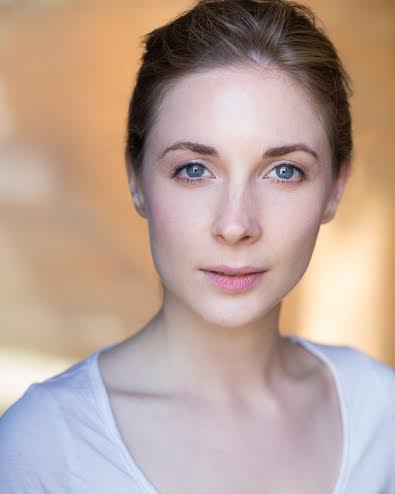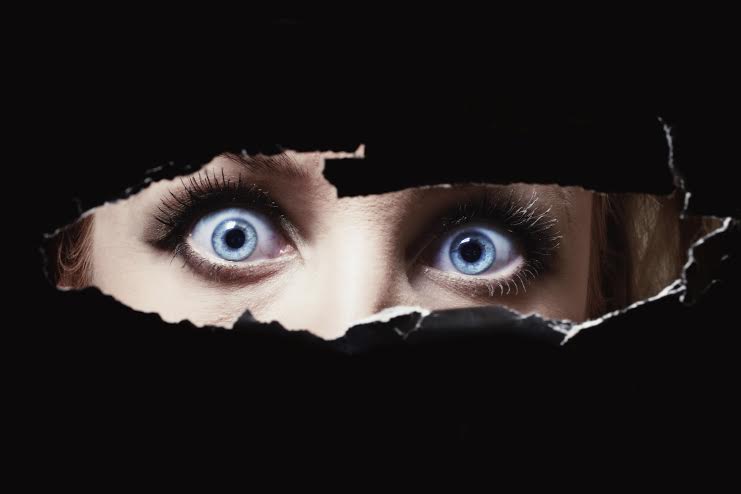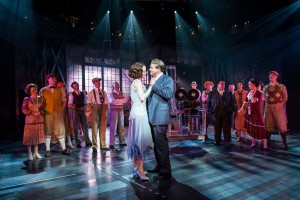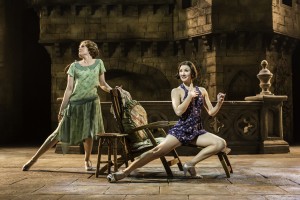 On election day, on May 7th, at 8:25pm, More4 is showing The Vote, a play by James Graham, set in a polling booth during the last 90 minutes before the polls close. The play, which will be screened live from the Donmar Warehouse (at the end of a two-week run), is a unique and ambitious project featuring a cast of over 50, including some stellar names. Chief among them is the acting royalty that is Dame Judi Dench, and her daughter, Finty Williams, who play, appropriately enough a mother and daughter.
On election day, on May 7th, at 8:25pm, More4 is showing The Vote, a play by James Graham, set in a polling booth during the last 90 minutes before the polls close. The play, which will be screened live from the Donmar Warehouse (at the end of a two-week run), is a unique and ambitious project featuring a cast of over 50, including some stellar names. Chief among them is the acting royalty that is Dame Judi Dench, and her daughter, Finty Williams, who play, appropriately enough a mother and daughter.
Meeting the pair in the quiet opulence of a library in a central London hotel, their bond and mutual affection is immediately palpable, as is their excitement about this remarkable play. Here, they discuss politics, plays and passion, and revel in the joys of working together.
Can you explain a little bit about the concept of The Vote?
F: James Graham and Josie Rourke came up with this idea to set a play in a polling station in Lambeth. They wanted to get a cross-section of people who would come into a polling station in an area like that. So it’s an extraordinary, 52-person event, and we’re a small part of it.
J: It’s impossible to get us all on stage at the same time. Just for the curtain acll.
F: It’s really extraordinary, we did the curtain call yesterday. I found it quite emotional. Seeing all those people on that stage.
J: It’s thrilling.
So, in that respect, is it completely unlike anything you’ve ever done before?
F: Yes!
J: Well, it’s not completely unlike anything I’ve done, because I’ve done the York Mystery Plays three times, and that’s a cast of an enormous amount of people all together, all rehearsing in bits and then getting it all together. This is nothing like that, in content, but I suppose in the working process it’s reminiscent of that. But we only came into it the week before last.
F: We thought we were starring in an epic! And then we saw the first run-through and realised we’re actually in fifteen minutes.
You’re in it longer than most…
F: We are, actually. And we’re very lucky, because we’re in it at the end.
Who do you play?
F: Amazingly, we play mother and daughter. We keep saying “Do we look like mother and daughter?” People look at us as though we’re mad.
J: And we play mother and daughter of the same name: Christine Lola Metcalfe.
F: And the same address.
J: Which is what causes the confusion in the play.
Although you’ve acted together before, is this the first time you’ve played mother and daughter?
F: I’ve been ma, as a younger person.
J: And you’ve been my daughter before. Only on film, though.
F: Oh yes, in Mrs Brown – we did that!
What was it that attracted you to the project?
F: Selfishly, we wanted to work together. But it’s amazing to be part of something that’s so exciting, that people who aren’t in it are so excited about. And at such an extraordinary time, as well. How lucky is that? And to be in a play by James, directed by Josie.
J: And for thirteen performances. It’s a part I’ve waited for all my life, I think. Being with Fint, and to open on one day and twelve days later to close. It’s thrilling.
F: The excitement never goes then.
J: It never goes, because you’re always nervous and always frightened. But it’s a real one-off, it’s exciting and innovative.
And it’s the first time you’ve performed at the Donmar for almost 40 years?
J: Yes. My husband was the first company into the Donmar, with Schweik in the Second World War in 1977, and we followed with…
F: You can say it…
J: I’m not saying it! We followed with the Scottish Play straight afterwards. Although I’ve been to the Donmar, of course, I haven’t played there again. It’s very nice being back there, although much of it I don’t recognise. I recognise the theatre itself, but not anything backstage. We were all in one dressing room back then, the whole company. You certainly couldn’t do that now.
F: It would be tricky to get 52 of us in one dressing room.
Finty, I read that you are most on edge when your family come and see you perform. Does that still apply when your mother is watching you from the other side of the stage?
J: We’re never the other side of the stage. We stick completely together!
F: It’s just about the people who you love the most, whose opinion you value the most. When they come and see it, that’s always a nerve-wracking thing, whether it’s ma, or my boyfriend, who’s an actor, or my son, or very close friends.
J: It’s always that night that you want to go best.
F: And you inevitably come out and go “Oh, but last night it was so much better!”
When you go and see each other in something, are you brutally honest afterwards, if it’s called for?
F: Ma is… this is like a therapy session! I think ma is more honest than I am sometimes. But we have a sort of understanding that if you haven’t enjoyed it then you appreciate the fact that the other person’s got to go on and do it for however many more weeks, and then you can be honest about what you thought of the play, or somebody else in it, or whatever, after they’ve finished.
On election night, the play is going to be broadcast live on More4. What’s that prospect like? Is it nerve-wracking? Do you even still get nervous?
J: Do I get nervous? Yes I do! I get nervous about putting one foot in front of the other. And more so as the years go by! But it’ll be very exciting, because it goes right up to ten o’clock.
F: So we’ll hear the actual exit polls at the end of the show.
J: And then there is a party that goes on all night. And breakfast for the survivors. I very much doubt I’ll be there by then. But, especially this time, what on earth is that night going to be like?
It’s filmed by fix rig cameras. Does that mean they’re very unobtrusive? Will you have performed with them in situ before the night itself?
F: I did The Scottish Play at The Globe…
You see, you can’t say it either…
F: I’m only not saying it because ma’s not saying it! Anyway, that was filmed.
J: I can’t tell you how obtrusive they are. I don’t think we’ll do a performance with them before the final one. We do camera rehearsals. But I don’t think there’s an actual performance with the punters in.
F: I think if you’re on of those actors who constantly looks out at the audience, you might notice them. But I try not to look. Do you?
J: Always try not to look.
There are some incidental scenes that take place in the play that will happen during the ad breaks of the More4 screening. Presumably that means the whole thing will have to be meticulously timed?
F: Yeah. I’m not going to worry about that.
J (laughing): That’s absolutely not our concern, is it?
F: I’m just going to say the lines, and hope we don’t take too long over them.
It’s a wonderful cast, isn’t it?
F: It’s extraordinary.
J: It’s a lovely cast.
F: One of my greatest friends from drama school is in it – Ghiv Chahidi. It’s taken us 21 years to work together. Although he’s worked with ma, and he’s worked with my boyfriend. But we’ve never worked together. And we end up standing next to each other at the end. But it’s amazing people, extraordinary to watch. You say the script is funny – and it is – but it’s genius, what certain people are doing with it. Proper comedic genius. It’s amazing.
What do you think The Vote is saying about the election, and about democracy in general?
J: I don’t know. It’s going to say a lot of different things to a lot of people, I think. It’s an across-the-board look at the situation at the moment and, in a way, how chaotic it is.
F: It’s such a diverse cross section of people who go into the polling station. It sounds naïve, but I’d sort of not really appreciated that you’d get that sort of cross section of people just coming in to one polling station.
J: Or not coming in. We’ve not said about that. All the people who are not going to vote. And feel no responsibility about it whatsoever.
Have you discussed among yourselves how you think your individual characters would vote?
J: My character votes Conservative. I’m settling for that. That’s the kind of person she is. And she’s appalled that her daughter turns to her and says “What do we vote?” She’s a dyed-in-the-wool Conservative.
Are either of you particularly political?
F: My boyfriend is. He’s been out canvassing for Labour. He’s really passionate about it. He’s desperately trying to get me and my son more politically-minded.
J: I have political views, and I voice them, and get very, very angry about things. In my family, we were advised not to talk about religion or politics when we were young. And so we’ve all been able to be very diverse and do what we wanted to do. And see other people’s points of view. Some of them more than others.
F (laughing): We like to see everyone’s point of view, apart from those who don’t agree with us.
It’s an extraordinary political moment. Are you excited about this election?
F: Slightly fearful.
J: Yes, I think I’m fearful. I’m curious about it. But I’m appalled, in a way, about the apathy there is about it. Someone said to me the other day “It’s the most boring election campaign that there’s ever been,” which I have to agree with, I’m afraid.
F: When they start picking up on how many kitchens people have… Really? Is that something that is going to sway people?
J: I heard a programme this morning saying that no-one goes out with a soapbox anymore, because there’s actual fear of doing that. It was interesting. There is a kind of behind the glass attitude to it all now – and actually not talking to people, not engaging with people. Saying the same things over and over again. It’s all election speak now. That’s not what it should all be about. I heard some young people talking, saying nobody talks a language they understand. No-one addresses what they’re thinking about. And indeed they don’t.
After you’ve performed on May 7th, what will you do…
J: Lie down!
Will you sit and watch the election into the early hours?
J: There’s going to be this big party, and breakfast.
F: I’m going to be at the party all night. I will stay there.
Will there be screens? Will it be a political thing?
J: Oh, I think definitely.
F: I’ll be there. I’ll be one of the ones having breakfast.
What’s the best thing about working together?
J: Shorthand. And the fact that we like it so much. We don’t have to pretend that we like it. We actually like it. Michael used to have an expression. He used to say “There are some jobs you run to do.” And for all the fear of having three days’ rehearsal for this, it is a job I run to do, and I can’t wait to actually have that thing of being onstage with Fint.
Was it the same sort of experience for you when you worked with Michael?
J: Yes, it was. You’re frightened for the other person too, so it’s double fright. We did Mr and Mrs Nobody, and Mikey said “We’re going to have such a blast doing this. Lots of laughs, and it’s not very long, so then we’ll get to go home.” Well, it was the hardest thing you can imagine. It was thrilling to do, but we were so tired at the end of the evening.
F: And the learning was tricky, wasn’t it? Ma used to be upstairs in our house with me, learning lines. Dad would be downstairs. We’d have a running supper, it would go round the house.
Was it things like doing lines with your mum that inspired you into the same line of work?
F: No. I don’t know if it’s the same thing if you’re the daughter of a brilliant brain surgeon, who is incredibly good at what they do, works with incredible people and – not quite the same for the brain surgeon – gets to wear great costumes. That’s inspiring. And ma makes it great fun. I spent most of my teenage years in the National Theatre. Mum would go on to do a scene in Hamlet, come back, get changed to go back on and do another scene, and she’d come back and I’d be wearing her entire first costume in the dressing room. That was what I loved. And to hear the applause at the end for her. That still really gets me. That’s the person I love, and they’re being appreciated by all these people. I watch Britain’s Got Talent, and someone’s there saying they’re proud of their parent or their daughter, and then they get a standing ovation, and I’m in floods of tears. It’s a really deep-seated pride.
J: Fint originally wanted to be an acrobatic nurse. And we were very, very keen. Michael said “You’ve got to do it.” Can you imagine? Swinging up the ward to take somebody’s temperature upside down. Absolutely thrilling.
How did you feel when she revealed her intention to go into acting?
We were incredibly excited about it, and said “I suppose it was inevitable.”
What are the roles that have meant the most to you over the years?
J: Over sixty years!
F: Anything at The Globe, because it’s just the best. Playing Maria in Twelfth Night at The National. Ma did a play called Entertaining Strangers when I was about 14, which totally changed my life, I loved it so much. It was directed by Peter Hall, and it was in the Cottesloe. And I remember saying to ma “If I coukld just be in a play directed by Peter Hall at the Cottesloe, I’d be the happiest person in the world. And when I was doing Bedroom Farce, that he directed, which was another big favourite, he asked me to audition for Maria in Twelfth Night in the Cottesloe. And I got the job, and I came out and phoned ma, and I stood on the phone to ma outside the National howling, literally howling. And later on, we were rehearsing for it, and it was all wonderful, and we were doing Malvolio’s letter scene, and they’d picked up a load of letters from the props store, and I opened a letter, and it was one of the letters that had been used in Entertaining Strangers all that time before. That was probably the best. Ma, 60 years, go for it!
J: It’s really for people, for actors and actresses and the company and the director of course, that you remember things. Plays I did with Mikey. When we got the chance to work together it was thrilling. Not so thrilling when we did The Merchant of Venice, a play I don’t like very much. We were just married, and I turned to him and said “I speak too long; but ’tis to peize the time, To eke it and to draw it out in length, To stay you from erection.” And it’s ‘election’ of course. At which point, the Royal Shakespeare band just put their instruments down and had to walk off.
I loved playing Anthony and Cleopatra, because I was an unbelievably unlikely choice to play Cleopatra. I loved every minute of it. And I loved working with Peter. And I loved A Little Night Music, getting to sing and do Cabaret.
F: There was also an amazing show she did called The Gift of the Gorgon, which she didn’t have the best time doing, it was a very tricky play. But it floored me. Amazing.
Are there any particular parts that either of you would particularly like to play?
J: I never know what part I should do. I can never think if what I’d like to do, I wait until somebody says “This is a part you ought to have a go at.” Fint?
F: I want to play Miss Adelaide in Guys and Dolls. Really badly. And I’d like to work with [boyfriend] Joe, properly. Like ma got to do with dad.
J: Perhaps we could all be in a play together.
F: We could age-up Guys and Dolls, and you could play Miss Adelaide.
J: No, no, no. I’d be an old person, sitting in a chair watching. Tapping my foot to the music.
If you could work on one other project together, what would you choose?
J: I like a new play.
F: Something where we have a big entrance at the end, down a big fl… actually, not down a big flight of stairs.
J (laughing): I could come down in a lift.
F: You could have a Stair Lift. And we could be wearing wonderful red dresses cut up to the thigh.
J: That would be very, very good!
F: And an amazing dance number. Maybe I’ll do the dance number. You can just stand still and do something extraordinary in the middle.
The Vote is on Thursday May 7th, at 8:25pm, More4
With thanks to Channel 4.
 Alexa Matthews – Photo by Michael Shelford
Alexa Matthews – Photo by Michael Shelford










